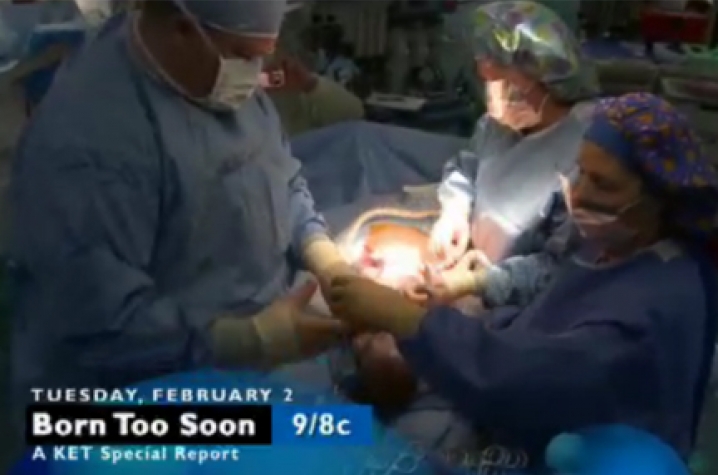KET Special: 'Born Too Soon'

LEXINGTON, Ky. (Feb. 1, 2010) – Kentucky Children’s Hospital's neonatal intensive care unit (NICU) will be featured in a KET special called "Born Too Soon," which examines high rates and devastating effects of preterm birth in Kentucky.
The program examines causes of preterm birth, the impact of scheduling labor for convenience, and efforts across the state to address this serious and costly health issue. A trailer is available for viewing online at www.ket.org/health/born-too-soon.htm#trailer. The program airs at 9 p.m. Tuesday, Feb. 2 on KET and at 8 p.m. Tuesday, Feb. 9 on KET2.
Prematurity is the number one cause of death for newborn infants, according to the March of Dimes. In the United States, about one in eight babies are born prematurely, and Kentucky has one of the highest rates of preterm births in the nation.
Premature babies are at a higher risk of respiratory distress, bleeding in the brain and death. They are also more likely to have serious life-long problems, including cerebral palsy, mental retardation, and attention deficit hyperactivity disorder, and to develop heart disease, high blood pressure or diabetes as adults. Research suggests that babies born just a few weeks early can develop serious problems.
Featured in the program are Kentucky Children's Hospital NICU babies and their mothers, as well as Kristin Ashford, assistant professor in the University of Kentucky College of Nursing and UK HealthCare women's health nurse practitioner, and Dr. Henrietta Bada, professor of pediatrics in the UK College of Medicine and chief of neonatology at Kentucky Children's Hospital.
Ashford focuses on smoking during pregnancy, which pertains to her research about health risks in pregnant women.
"Over the past decade, the rate of preterm birth is has steadily increased making it one of the nation’s most costly epidemics," Ashford said. "Kentucky ranks second in the nation for the number of women who smoke during pregnancy, with some counties reporting rates as high as 50 percent."
Bada talks about some of the issues that late preterm babies face in the NICU as well as those she has observed around preterm birth.
"We want everyone to understand that even late preterm babies act like preterm infants and therefore, they are at high risk for complications related to prematurity," Bada said. "These babies don't react like the normal-term well babies. The current medical recommendations are that elective inductions and Caesarian sections should wait until 39 weeks of gestation or later."
"Born Too Soon" also visits the neonatal intensive care units at King’s Daughters Medical Center in Ashland and Trover Clinic in Madisonville.
The program meets parents of preemies, who share their stories, including one mom whose early C-section led to a roller coaster of emotion in the NICU. Viewers will hear from doctors and experts about important efforts to reduce the number of preterm births in Kentucky and nationwide. Some of the root causes of the current preterm birth crisis are examined along with programs that help moms and promote full-term pregnancies.
"Born Too Soon" was funded in part by a generous contribution from the Foundation for a Healthy Kentucky. KET developed this program in collaboration with the Kentucky Department for Public Health and the March of Dimes. The special is a KET production. Laura Crawford is the producer.
For more information on the KET feature, contact Todd Piccirilli at TPiccirilli@ket.org. For more information about critically ill newborns, go to http://www.ukhealthcare.uky.edu/KCH/services/neonatology.htm. For more information about Kentucky Children's Hospital, go to Kentucky Children’s Hospital or contact Loralyn Cecil at (859) 257-1106 or laceci2@uky.edu.




